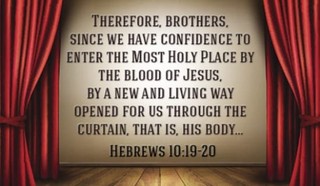
- Recent Translations
- All Translations
Hebrews 10:38 Meaning and Commentary
Now the just shall live by faith
The "just" man is one not in appearance only, but in reality; not by his obedience to the law, but by the obedience of Christ; and he is evidently so by the Spirit, and by faith: and he is one, who lives soberly and righteously; and the life he lives, and shall live, at present, is, not eternal life; for though he shall live that life, yet this is not intended; for it is a living by faith that is spoken of, and as antecedent to the coming of Christ; but a spiritual life is meant, a life of justification in Christ, a life of communion with Christ, and a life of holiness from Christ, with peace, joy, and comfort through him: and the manner of this just man's living is "by faith"; not upon his faith, but upon Christ, the object of it; and by "his faith", as in ( Habakkuk 2:4 ) his own, and not another's; or by the faith of Christ: the Syriac version here renders it, "by the faith of myself"; that is, by the faith of Christ, who speaks, and who is the author and object of faith: the Alexandrian copy and the Vulgate Latin version read, "my just man shall live by faith"; and this life is to be now, in the mean while, until Christ comes, and because he will certainly come:
but if [any man] draw back, my soul shall have no pleasure in him.
The Hebrew word (hlpe) , used in ( Habakkuk 2:4 ) and which, by the Septuagint there, and by the apostle here, is translated by (uposteilhtai) , and rendered "draw back", according to R. David Kimchi F3 signifies, pride and haughtiness of heart; and, according to R. Sol. Jarchi F4 it signifies impudence; R. Moses Kimchi F5 takes it to be the same with (lpe) , which is used for a tower, or fortified place; and thinks it designs one who betakes himself to such a place for safety from the enemy, and seeks not to God for deliverance: so that such a person seems to be designed, who swells with pride and confidence in his own righteousness; who betakes himself to some fortress of his own for safety; who withdraws from the assembly of the saints, through fear of reproach and persecution; who withholds the truth, shuns to declare it, or maintain a profession of it; plays the hypocrite, and deals deceitfully in religious things; and, in short, it may intend one, who finally and totally apostatizes from the doctrine of faith, and the profession of it: and in such persons God has no pleasure, never had, nor never will have; but, on the contrary, they are abominable to him, and will lie under his sore displeasure, and feel the keen resentments of it; such stand opposed to the just man, that lives by faith, walks humbly with God, in a dependence, not on his own righteousness, but on the righteousness of Christ, in which he is safe from condemnation, and secure of the divine favour; for drawing back is not supposed of the just man, but of any man, as we, with the Ethiopic version, rightly supply; and is to be understood of anyone of the external professors of religion, who forsake the assembling of the saints, ( Hebrews 10:25 ) and is denied of the truly righteous in the following words.
F3 In Hab. ii. 4.
F4 In ib.
F5 Apud R. David Kimchi in ibid. & in Sepher Shorashim, rad. (lpe) .
Hebrews 10:38 In-Context
Footnotes 2
- [a] Or possibly this may read 'my just [man].' i.e. God's just one, the one he owns as such. There is good authority for it. The sense runs well and is the same.
- [b] Or 'any one.' The apostle is contrasting two characters; the one who perishes, and the one who saves, preserves, his life (spiritually, of course). The professing Hebrews were in danger of drawing back. It is certain that in what the apostle quotes (Hab. 2.3,4) there is no reference in the word 'he' to the just who lives by faith. The Hebrew and the LXX prove this. All through this Epistle the Hebrews who acknowledged Jesus as Messiah are treated as a people; that is, the whole people accepted on condition of believing. So Peter: 'but are now the people of God.' And here: 'Jesus, that he might sanctify the people with his own blood.' In this Epistle there is nothing of the sanctification of the Spirit; but the writer urges as a practical truth 'the just shall live by faith:' and then he says, 'and, if he draw back;' that is, any one holding this position of a professed believer; but if he was living by faith in him, he was not drawing back. In a word, drawing back is one character, living by faith another.

